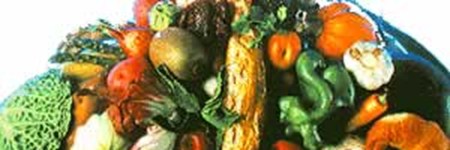Stress diet
DEFINITION
The aim of the diet for Stress is to minimise the digestive
load while maintaining a consistent intake of food, especially
complex carbohydrates, throughout the day. It is important to
provide adequate amounts of B group vitamins and vitamin C which
are used more quickly during times of stress.
load while maintaining a consistent intake of food, especially
complex carbohydrates, throughout the day. It is important to
provide adequate amounts of B group vitamins and vitamin C which
are used more quickly during times of stress.
DIET SHOULD BE HIGH IN
- B GROUP VITAMINS – which counteract the biochemical effects of
stress. Good sources are pork, liver, wholegrain cereals, wholemeal
bread, yeast, milk, seafood and red meat. - VITAMIN C – which provides immune support. Good sources are
citrus fruits, melons, strawberries, blueberries, guava, kiwi
fruit, pineapple, capsicum, tomato, parsley and broccoli. Vitamin C
is readily destroyed by cooking and exposure to air. - COMPLEX CARBOHYDRATES – which provide a steady, long-lasting
source of energy. Include some wholemeal or grain bread, scones,
rice, pasta, wholegrain cereals, potato or crispbreads at every
meal or snack. - POTASSIUM supports the adrenal glands which regulate the stress
response. Potassium is also indicated for nervous exhaustion,
anxiety, poor memory and neuromuscular disorders. Potassium sources
include fresh fruits, vegetables, wholegrains, orange juice, tomato
juice, skim milk, bananas, potatoes, oats, pears, peaches and
apricots also contain Potassium. - MAGNESIUM. Deficiency is associated with prolonged stress, and
behaviour and mood disorders. Sources include nuts, seeds, soy
products and wholegrain cereals.
DIET SHOULD BE LOW IN
- FATTY FOODS – Avoid fried foods, added and visible fats and
oils, invisible fats in full cream dairy foods, chocolate, cakes,
biscuits, pastry, mayonnaise and most take-away foods. Fats delay
digestion when digestion is already compromised by the stress
reaction. - CAFFEINE – which acts as a stimulant and may aggravate anxiety,
nervous tension and sleeplessness. Sources of caffeine are coffee,
tea, cola-type drinks and chocolate. Drink filtered water, non-cola
drinks, herbal teas and decaffeinated coffee. - SUGARY FOODS AND REFINED STARCHES which deplete B vitamins when
being processed in the body - ALCOHOL – which also uses up B vitamins, especially Thiamin
(vitamin B1).
SAMPLE MEAL PLAN
- 2 glasses water upon arising.
BREAKFAST
- One cup bran-flake cereal with low-fat milk, or 1 cup rolled
oats porridge with low-fat milk, or 1/2 a cup baked beans or two
slices wholemeal toast, or one egg boiled, poached, scrambled on
two slices wholemeal toast with tomato, grilled. - One piece fresh fruit – pawpaw, orange, melon.
- Decaffeinated coffee or herbal tea.
MORNING TEA
- 2-3 wholemeal crispbreads with tomato.
- Two glasses of water.
LUNCH
- Two slices of wholemeal bread, or one bread roll, or 2/3 to one
cup brown rice, or wholemeal pasta. - Thin slices leg ham or chopped chicken, turkey or salmon,
tuna. - Salad vegetables or lightly steamed vegetables.
- One piece fresh fruit – strawberries, kiwi fruit,
pineapple. - Decaffeinated coffee or herbal tea.
AFTERNOON TEA
- Small tub low fat yoghurt or a glass of low fat milk.
- Two glasses of water.
DINNER
- 100-150g chicken breast or thigh fillet, lean pork fillet, or
veal leg steak or lean mince, or soybean rissoles and fresh tomato
sauce, or tomato omelette, or 150 to 200g grilled fish or tuna or
salmon mornay. - Half to one cup brown rice or vegetable pasta, or one medium
jacket potato or sweet potato, or one medium serving of oven-fry
low fat chips with half a cup carrot, pumpkin, corn. One cup or
more lightly steamed broccoli, cabbage, beans, peas, or other green
vegetables or salad. - One piece fresh fruit or one cup fruit salad. Low fat ice-cream
or custard on low fat milk. - Decaffeinated coffee or herbal tea.
REMEMBER
- Eat little and often through the day and include some high
fibre, starchy food at each meal and snack. - Eat three or more pieces of Vitamin C rich fruit daily
- Avoid fatty foods and heavy meals, caffeine beverages, sugary
and refined foods with little or no vitamin value. - Drink plenty of fluids.
- Maintain normal bowel function.
- A glass of warmed, low fat milk before bed may help
sleeplessness.
NOTES
Small, frequent meals are preferable. If the appetite is poor
from anxiety and nervous tension, nourishing protein drink
supplements may be beneficial. Bowel function may be affected
either way as constipation or frequency (see separate guidelines on
these conditions).
from anxiety and nervous tension, nourishing protein drink
supplements may be beneficial. Bowel function may be affected
either way as constipation or frequency (see separate guidelines on
these conditions).

